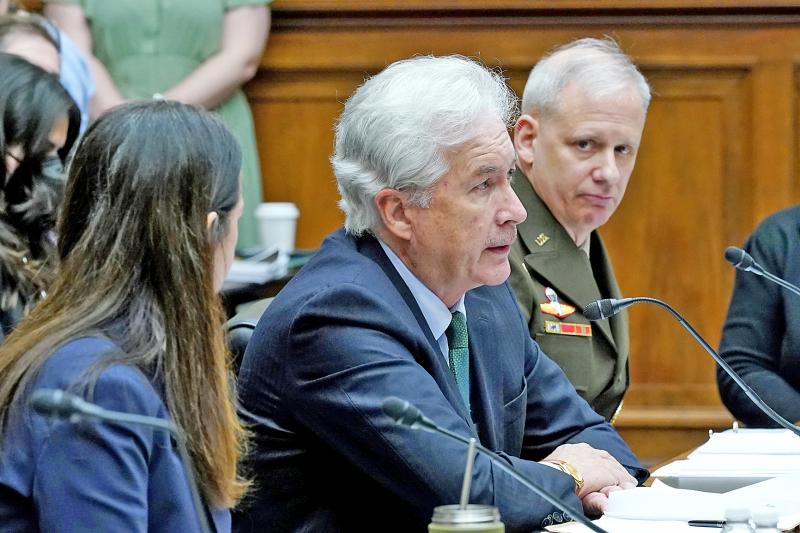CIA Director William Burns on Saturday said that China is closely monitoring Russia’s conflict in Ukraine and that it is affecting Chinese leaders’ calculations over Taiwan.
Burns, speaking at a Financial Times event in Washington, said the Chinese government had been struck by Ukraine’s fierce resistance to Russia’s invasion and by the economic costs Russia is bearing.
“I think the Chinese leadership is looking very carefully at all this — at the costs and consequences of any effort to use force to gain control over Taiwan,” Burns said.

Photo: AP
However, he cautioned that it would not shift Chinese President Xi Jinping’s (習近平) long-term goals over Taiwan.
“I don’t for a minute think that this has eroded Xi’s determination over time to gain control over Taiwan,” Burns said. “But I think it’s something that’s affecting their calculation about how and when they go about doing that.”
China has refused to condemn Russia’s war in Ukraine and has criticized Western sanctions on Moscow.
Beijing and Moscow declared a “no limits” strategic partnership several weeks before the Feb. 24 invasion, and have been forging closer energy and security ties in recent years to push back on the US and the West.
However, Burns said the US believed China was unsettled by the reputational damage of being associated with the “brutishness” of Russian President Vladimir Putin’s military action.
“I think what the bitter experience, in many ways, of Putin’s Russia in Ukraine over the last 10 or 11 weeks has done is demonstrate that that friendship actually does have some limits,” Burns said.
Separately, US Representative Mark Green on Thursday said China would face an even more united response than Russia is facing now if Beijing were to invade Taiwan.
Green made the remarks during an appearance at the NewsNation show On Balance with Leland Vittert, when Vittert asked: “Can the world come together against China if they invade Taiwan?”
“Yeah, I think so,” Green said, adding: “While you’re sort of looking at the difference between China and Russia, I’d suggest you look at the difference economically between Taiwan and Ukraine.”
“Taiwan makes 94 percent of all the high-end semiconductors. The West cannot tolerate China seizing control of Taiwan,” he said.
“So absolutely we are going to push back. Everyone is going to unite and probably even more so than with Ukraine,” he added.
Green said the US could and should do more to help Taiwan defend itself.
“What we’ve got to do is make the consequence of China attacking Taiwan so great that they choose not to do so. That’s real deterrence,” he said.
Additional reporting by staff writer

DAREDEVIL: Honnold said it had always been a dream of his to climb Taipei 101, while a Netflix producer said the skyscraper was ‘a real icon of this country’ US climber Alex Honnold yesterday took on Taiwan’s tallest building, becoming the first person to scale Taipei 101 without a rope, harness or safety net. Hundreds of spectators gathered at the base of the 101-story skyscraper to watch Honnold, 40, embark on his daredevil feat, which was also broadcast live on Netflix. Dressed in a red T-shirt and yellow custom-made climbing shoes, Honnold swiftly moved up the southeast face of the glass and steel building. At one point, he stepped onto a platform midway up to wave down at fans and onlookers who were taking photos. People watching from inside

A Vietnamese migrant worker yesterday won NT$12 million (US$379,627) on a Lunar New Year scratch card in Kaohsiung as part of Taiwan Lottery Co’s (台灣彩券) “NT$12 Million Grand Fortune” (1200萬大吉利) game. The man was the first top-prize winner of the new game launched on Jan. 6 to mark the Lunar New Year. Three Vietnamese migrant workers visited a Taiwan Lottery shop on Xinyue Street in Kaohsiung’s Gangshan District (崗山), a store representative said. The player bought multiple tickets and, after winning nothing, held the final lottery ticket in one hand and rubbed the store’s statue of the Maitreya Buddha’s belly with the other,

Japan’s strategic alliance with the US would collapse if Tokyo were to turn away from a conflict in Taiwan, Japanese Prime Minister Sanae Takaichi said yesterday, but distanced herself from previous comments that suggested a possible military response in such an event. Takaichi expressed her latest views on a nationally broadcast TV program late on Monday, where an opposition party leader criticized her for igniting tensions with China with the earlier remarks. Ties between Japan and China have sunk to the worst level in years after Takaichi said in November that a hypothetical Chinese attack on Taiwan could bring about a Japanese

‘COMMITTED TO DETERRENCE’: Washington would stand by its allies, but it can only help as much as countries help themselves, Raymond Greene said The US is committed to deterrence in the first island chain, but it should not bear the burden alone, as “freedom is not free,” American Institute in Taiwan Director Raymond Greene said in a speech at the Institute for National Defense and Security Research’s “Strengthening Resilience: Defense as the Engine of Development” seminar in Taipei yesterday. In the speech, titled “Investing Together and a Secure and Prosperous Future,” Greene highlighted the contributions of US President Donald Trump’s administration to Taiwan’s defense efforts, including the establishment of supply chains for drones and autonomous systems, offers of security assistance and the expansion of